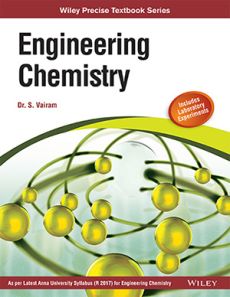Engineering Chemistry: As per Latest Anna University Syllabus (2017) for Engineering Chemistry
ISBN: 9788126569984
280 pages
For more information write to us at: acadmktg@wiley.com

Description
Engineering Chemistry course for the first-year undergraduate students is designed to link theoretical concepts with their practical applications. The book is structured keeping in view the objective of the Engineering Chemistry course for the first semester students. It is strictly as per the syllabus of Anna University (affiliated colleges) regulation 2017. The book aims to impart an in-depth understanding of chemistry as applied to engineering. It deals with advanced and industrially useful topics, such as Water and its Treatment, Surface Chemistry and Catalysis, Alloys and Phase Rule, Fuels and Combustion and Energy Sources and Storage Devices.
Chapter 1 Water and its Treatment
1.1 Introduction
1.2 Alkalinity of Water
1.3 Hardness of Water
1.4 Determination of Hardness of Water
1.5 Domestic Water Treatment
1.6 Boiler Feed Water
1.7 Treatment of Boiler Feed Water
1.8 Desalination
Chapter 2 Surface Chemistry and Catalysis
2.1 Adsorption Phenomenon
2.2 Types of Adsorption
2.3 Factors Affecting Adsorption
2.4 Adsorption of Gases by Solids
2.5 Adsorption of Solutes from Solution by Solids
2.6 Adsorption Techniques
2.7 Some Important Adsorbents Used in Industry
2.8 Applications of Adsorption
2.9 Catalysts
Chapter 3 Phase Rule and Alloys
3.1 Introduction
3.2 Definition of Terms
3.3 Phase Rule
3.4 Phase Diagram
3.5 One-Component System
3.6 Two-Component Systems
3.7 Alloys
3.8 Ferrous Alloys
3.9 Non-Ferrous Alloys
Chapter 4 Fuels and Combustion
4.1 Introduction
4.2 Classifications of Fuels
4.3 Calorific Value
4.4 Determination of Calorific Value
4.5 Solid Fuels – Coal
4.6 Proximate and Ultimate Analyses of Coal
4.7 Coke
4.8 Liquid Fuels – Petroleum
4.9 Synthetic Petrol
4.10 Gaseous Fuels
4.11 Power Alcohol
4.12 Biofuels
4.13 Combustion
Chapter 5 Energy Sources and Storage Devices
5.1 Introduction
5.2 Nuclear Energy
5.3 Solar Energy
5.4 Wind Energy
5.5 Other Non-Conventional Energy Sources
5.6 Fuel Cells
5.7 Batteries
5.8 Primary Cells
5.9 Secondary (Storage) Cells
5.10 Supercapacitors
5.11 Types of Double Layer Capacitors
Experiment 1 A Estimation of HCl Using Na2CO3 as Primary Standard
Experiment 1B Determination of Alkalinity in Water Sample
Experiment 2 Estimation of Total, Temporary and Permanent Hardness of Water by EDTA Method
Experiment 3 Determination of DO Content of Water Sample by Winkler’s Method
Experiment 4 Determination of Chloride Content of Water Sample by Argentometric Method
Experiment 5 Standardization of Sodium Thiosulphate Solution and Volumetric Estimation of Cu(II) Iodometrically
Experiment 6 Determination of Strength of Hydrochloric Acid Using pH Meter
Experiment 7 Determination of Strength of Acids in a Mixture Using Conductivity Meter
Experiment 8 Estimation of Iron Content of the Given Solution by Using Potentiometer
Experiment 9 Estimation of Iron Content of the Water Sample Using Spectrophotometer
Experiment 10 Determination of Sodium and Potassium by Flame Photometry
Experiment 11 Determination of Molecular Weight of Polyvinyl Alcohol Using Ostwald Viscometer
Experiment 12 Pseudo First Order Kinetics-Ester Hydrolysis: Determination of Rate Constant- Acid Hydrolysis of Methyl Acetate
Experiment 13 Corrosion Experiment: Weight Loss Method
Experiment 14 Determination of Critical Micelle Concentration
Experiment 15 Phase Change in a Solid: Determination of the Solid-Liquid Phase Diagram for Naphthalene-Biphenyl Using Thermal Analysis
Experiment 16 Conductometric Titration of a Strong Acid vs Strong Base
Model Question Paper

